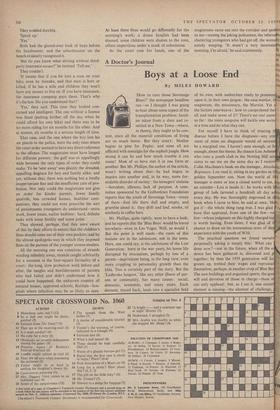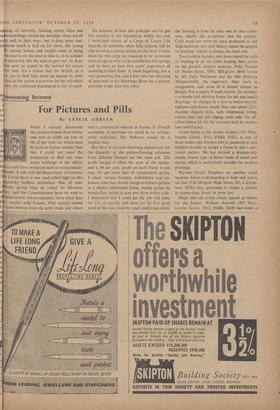A Doctor's Journal
Boys at a Loose End
ye e. tri Or
By MILES HOWARD 'How to cure those Stevenage Blues?' the newspaper headline ran—so I thought I was going to hear about some aspect of the transplantation problem: famil- ies taken from a slum and re- settled in a New Town—where, in theory, they ought to be con- tent, since all the material conditions of living are so much better. But they aren't : Mother begins to pine for Poplar, and soon all are afflicted with nostalgia for the asphalt jungle. How strong it can be and how much trouble it can cause ! Most of us have met it in one form or another. But Mr. Phillips, the author of the article, wasn't writing about that—he had begun to inquire into another and, in its way, more for- midable disorder of society : the teenagers' malaise —boredom, idleness, lack of purpose. A com- mittee sponsored by the Gulbenkian Foundation reports that the youth of Stevenage Town—many of them—find life there dull and empty, and grumble about it : they drift and loaf, smoke, sit aimlessly in coffee bars.
Mr. Phillips, quite rightly, went to have a look; and he reports that the 'Blue Boys' would be bored anywhere—even in Las Vegas. Well, so would I. But the point is well made—the roots of this malaise are in the adolescent, not in the town. Here, one could say, is the adolescent of the Lost Generation : born in the war years, his home life disrupted by evacuation, perhaps by loss of a parent—deprivation being, in the long view, even more crippling to personality growth than the blitz. This is certainly part of the story. But the `Ladbroke languor,' like any other illness of per- son or community, has many causes : social, domestic, economic, and many more. Each element, traced back, leads into a specialist field of its own, with authorities ready to pronoun upon it, in their own jargon : the case-worker, t magistrate, the missionary, the Marxist. Yet the factors interweave : how to comprehend tilt all and make sense of it? There's no real ansm so far : the more sanguine will tackle one secti at a time and do what they can.
For myself I have to think of treating t disease before I have the diagnosis—any col ment of mine on diagnosis- would of necess be a marginal one. I haven't seen enough, or fe enough, about the theme. By chance Lou Ashnu who runs a youth club in the Notting Hill art came to see me on the same day as I receiv Colin Maclnnes's book on the teenager, Absolt, Beginners. Lou read it, sitting in my garden in t golden September sun. Now the world of t teenager is more or less a closed world to me, an outsider—Lou is inside it : he works with group of lads (around a hundred) all day al every day. He was thoroughly engrossed in t■ book when I came to him; he said at once, lit got ie—the whole thing rang true. I was glad have that appraisal, from one of the few—ve few—whose judgment on this highly charged top is worth having. Even more, I was glad of tl chance to draw on his tremendous store of dire experience with the youth of W10.
The practical question we found ourselv perpetually asking is simply this : What can I done now?—not in the future, when all the ev dente has been gathered in, discussed and r) together; by then the 1959 generation will hal grown up, trebled their wages and reproduct themselves, perhaps, in another crop of Blue Boy The new buildings and organised sports, the go will and devotion of those in charge—these o can only applaud : but, as I see it, one essentl element is missing—the element of challenge,
01 tic rn
Pp lei es na t, ra
oldZard, of adversity. Making colour films and ve'e-recordings, classes for dancing—these are all Ti'y well in their way : but it does seem that, El Weyer much is laid on for them, the young It remain listless, and torpid—what is being strated is not the need to take in, to be amused d distracted, but the need to give out. As Kurt hn said, an appeal to the instinct for rescue ver fails. It's a truism that the British, as a e, are at their best when up against it; what true for the nation is also true for the individual only the confirmed psychopath is out of reach. An instance of how this principle can be put into practice is the foundation within the club I mentioned above, of a Corps of Canoe Life Guards; its members, when fully trained, will be able to act as a rescue service on the river. Candi- dates for the corps are required to be seventeen years of age or over; to be qualified in life-saving; and to have at least two years' experience of canoeing behind them. A small beginning, but a very promising one, and I feel sure that this kind of approach to the Stevenage Blues has a greater potential scope than any other.







































 Previous page
Previous page